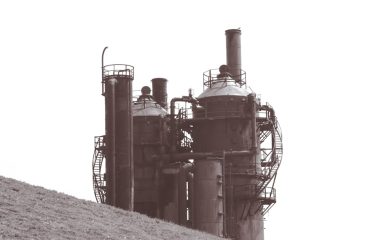Oil refineries are complex and hazardous environments, demanding materials of exceptional strength, durability, and corrosion resistance. At the heart of these operations lies a vast network of steel pipes, silently carrying the lifeblood of the industry – crude oil, refined products, and various process fluids. This blog post delves into the critical role these steel pipes play, exploring the materials used, manufacturing processes, safety considerations, and the ongoing advancements in this essential component of refinery infrastructure.
1. Material Selection: Choosing the Right Steel for the Job
The selection of steel for refinery pipes is far from arbitrary. It’s a meticulous process that considers numerous factors, including the fluid being transported, operating temperature and pressure, and the corrosive environment. Commonly used steel grades include:
- Carbon Steel: A cost-effective option for many applications, carbon steel offers good strength and weldability. However, its susceptibility to corrosion necessitates protective coatings or the use of higher-alloy steels in more aggressive environments.
- Low-Alloy Steel: These steels contain small additions of alloying elements like chromium, molybdenum, and vanadium, enhancing strength, toughness, and corrosion resistance compared to carbon steel. They are often preferred for high-temperature or high-pressure services.
- Stainless Steel: For applications involving highly corrosive fluids or extreme temperatures, stainless steel, particularly austenitic grades like 304 and 316, is the material of choice. Its superior corrosion resistance is crucial in preventing leaks and maintaining operational integrity.
- Alloy Steels: In specialized applications, such as handling highly corrosive chemicals or resisting specific types of degradation, specialized alloy steels with tailored compositions are employed. These may include duplex stainless steels or superaustenitic grades.
The selection process also involves careful consideration of relevant industry standards and codes, such as ASME (American Society of Mechanical Engineers) and API (American Petroleum Institute) specifications, which dictate the required mechanical properties and testing procedures.
2. Manufacturing Processes: Precision and Quality Control
The manufacturing of steel pipes for refineries is a highly regulated process, demanding stringent quality control at every stage. Common manufacturing methods include:
- Seamless Pipes: Produced by piercing and rolling a solid steel billet, seamless pipes offer superior strength and resistance to internal pressure compared to welded pipes. They are often preferred for high-pressure applications.
- Welded Pipes: Manufactured by joining two steel plates or sheets using various welding techniques (e.g., electric resistance welding, submerged arc welding), welded pipes offer a cost-effective alternative for lower-pressure applications. Advanced welding techniques ensure high-quality welds that meet stringent standards.
Regardless of the manufacturing method, rigorous testing is essential to ensure the integrity of the pipes. This includes non-destructive testing (NDT) techniques such as ultrasonic testing, radiographic testing, and magnetic particle inspection to detect flaws and ensure the pipes meet the required specifications.
3. Installation and Maintenance: Ensuring Operational Safety
The safe and efficient installation of steel pipes within a refinery is paramount. This requires specialized expertise and adherence to strict safety protocols. Proper welding techniques, adherence to design specifications, and thorough leak testing are critical steps in preventing accidents and ensuring operational reliability. Regular maintenance inspections are crucial to identify potential issues early on, including corrosion, erosion, and mechanical damage. These inspections often involve visual checks, thickness measurements, and NDT techniques.
Furthermore, a comprehensive pipeline integrity management (PIM) program is essential for long-term safety. This involves regular inspections, risk assessments, and proactive measures to mitigate potential risks. Advanced technologies, such as intelligent pigging, help to detect internal defects and ensure the ongoing safety and efficiency of the piping systems.
4. Safety and Regulatory Compliance: A Critical Aspect
The oil and gas industry is highly regulated, with stringent safety standards dictating the design, manufacturing, installation, and maintenance of refinery piping systems. Compliance with these regulations is not merely a matter of legal obligation; it’s a crucial aspect of preventing accidents, protecting personnel, and safeguarding the environment. Regulations often address issues like pressure rating, material selection, welding procedures, and inspection protocols. Failure to comply can result in severe penalties and jeopardize the entire operation.
Regular safety audits and training programs are essential to ensure that all personnel involved in handling and maintaining refinery pipes are adequately trained and aware of the potential hazards. Emergency response plans should also be in place to handle potential leaks or other incidents.
5. Future Trends and Innovations: Advancements in Refinery Piping
The industry is constantly striving for improvements in refinery piping systems. Advanced materials, such as high-strength low-alloy steels and corrosion-resistant alloys, are continually being developed to enhance performance and durability. Smart pipes, incorporating sensors and data analytics, are emerging to provide real-time monitoring of pipeline conditions, enabling predictive maintenance and proactive risk management. This move towards digitalization promises to enhance safety, efficiency, and environmental sustainability.
Furthermore, research into advanced welding techniques and non-destructive testing methods continues to improve the quality and reliability of refinery piping systems. The development of more efficient and environmentally friendly coatings and linings is also an area of ongoing research and development.
In conclusion, steel pipes are the unsung heroes of oil refineries. Their selection, manufacturing, installation, and maintenance are critical aspects of ensuring the safe, efficient, and reliable operation of these complex industrial facilities. The ongoing advancements in materials science, manufacturing techniques, and digital technologies continue to improve the performance and longevity of these essential components, contributing to a safer and more sustainable future for the oil and gas industry.
Tags: steel pipes, oil refinery, refinery pipes, carbon steel pipes, stainless steel pipes




